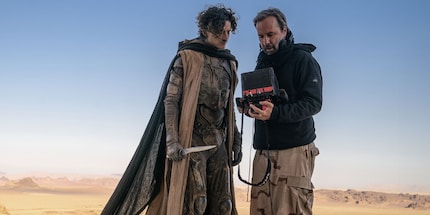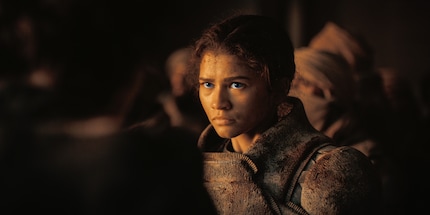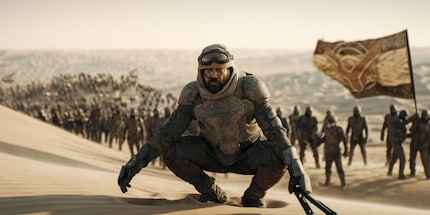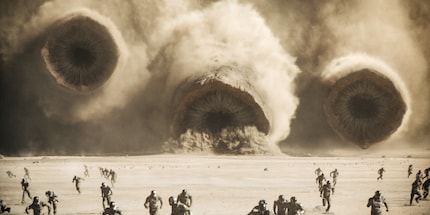
Review
The Running Man: entertainment instead of alarm bells
by Luca Fontana

Dune: Part Two is without doubt a triumph of science fiction cinema. It’s more powerful, yet more intimate than part one. Director Denis Villeneuve is a master of his trade. May his knife chip and shatter.
Let me start off by saying that this review contains no spoilers. I won’t be mentioning anything that hasn’t already been revealed in trailers.
After I saw Dune: Part One, I wrote that the film «slipped through my fingers like sand» despite its breathtaking visual splendour. I was missing the «why». Why all the fuss about the fate of crown prince Paul Atreides? I didn’t get it. The sheer opulence of the movie floored me. But I also felt like I’d seen what was merely an overextended prologue of an even bigger story.
Not my smartest moment.
But that’s precisely what’s so challenging about writing a film review. You usually have about two hours after the press screening before the critics’ embargo is lifted. If you miss the deadline, you’ll fall victim to online algorithms. It would’ve taken Dune: Part One more than two hours for its effect on me to fully develop. As Chani even told Paul at the end, «This is just the beginning,». Only much later did I realise this was no bad thing.
In fact, it’s precisely the reason I now consider the adaptation of the first half of Frank Herbert’s Dune to be one of the best, most daring films of all time. While the prologue «merely» puts the chess pieces into position, Dune: Part Two is the movie in which they’re finally brought to life.
The House of Atreides has been betrayed, deceived and wiped out. Once one of the most powerful aristocratic houses in a galaxy controlled by a feudalistic empire, all that remains of it now is young Paul Atreides (Timothée Chalamet). Hiding in a desert so deadly that even the hardy House Harkonnen steer clear of it.
The desert is located on the inhospitable planet of Arrakis, where a drug known as «Spice» comes from. But it’s also the most important substance in the universe. Not only does it prolong human life, it also makes interplanetary travel possible. Gaining control of Arrakis means gaining control of the spice – and unimaginable wealth. This proved to be the downfall of House Atreides, formerly the stewards of Arrakis, when House Harkonnen claimed the planet for themselves.
But Paul, the sole survivor, doesn’t just lie down and take it. Hidden among the native Fremen, the desert people of Arrakis, the former crown prince transforms into a leader, messiah and saviour. But there’s more to it. He has visions. Visions of thousands of battles, millions dead, billions of lives thrown into chaos. What if his desire for revenge triggers the terrible interplanetary war prophesied by the oppressed Fremen on Arrakis for generations, with him at the forefront of it all?
Frank Herbert’s Dune saga is undoubtedly one of the most formidable challenges director Denis Villeneuve has ever faced. And that’s saying something. Especially when I think of his previous works, such as Arrival and Blade Runner 2049. Dune, however, is more than a saga. It’s one of the most monumental epics of our time. One that not only deals with complex themes such as colonisation, exploitation, revolution and religious redemption, but also the recurring battle for rare resources. Crude oil, for example. Or spice. Even in a future that takes place thousands of years from now. It’s powerful stuff.
Herbert wrote six books about it, taking his time doing so. The first book was published in 1965, the last in 1985. Back when he was 14, the now 56-year-old Villeneuve dreamed of making Dune into a movie. He called the first book «a revelation». «His» world. A significant source of inspiration. Still too young to afford his own film camera, the teenage Villeneuve spent entire summers drawing up detailed storyboards for what would one day become his magnum opus. He bided his time, knowing his day would come.
Little by little, the French Canadian crept towards his goal. First, he shot the slow but incredibly intense drug thriller Sicario. It wasn’t until Arrival that he made his first foray into science fiction. He then honed skills such as pacing, atmosphere and composition, most notably in Blade Runner 2049. Training he knew would stand him in good stead one day. Years later, when Villeneuve finally did get the chance to fulfil his childhood dream, he jumped at it.

It’s become clear that Villeneuve loves the world of Dune. He understands it. His instinctive decision to split the first book into two films, for example, was a bold move. In the first part of that book, nothing and everything happens. Nevertheless, Villeneuve’s intuition was spot on. Otherwise he’d hardly have been able to do justice to the multilayered epic, which many renowned directors, including David Lynch, have already failed to achieve. The desert world, political intrigues and magnificent dynasties with all their stories and mythologies are too big. Villeneuve would’ve had to cut too much to even begin to pack all that into one movie. Dune would’ve lost its impact.
Its gravitas.
At the same time, Villeneuve, who also wrote the screenplay, certainly doesn’t follow the original sentence for sentence. He knows when to deviate from the source material. And when to implement character transformation to put across something Frank Herbert was unable to in his book. A prime example of this is Fremen Chani, played by Zendaya.
Ahead of the movie’s release, Villeneuve and Zendaya talked about the fact Chani’s role would deviate from the one in the original book. As a result, people protective of Frank Herbert’s vision were concerned Hollywood was once again trying to change fundamental elements in a mad rush to embrace inclusion and progressivism. Concerns that fortunately proved unfounded.
In this version, Zendaya’s Chani is no longer the daughter of Javier Bardem’s Stilgar. And unlike in the book, she isn’t simply following orders from her father and the Sietch Tibrs leader when she takes Paul under her wing. She does it to educate him on the culture of the Fremen – a people who’ve made a home out of what’s perhaps the most dangerous place in the universe. Her motivations are more personal. More human. And most importantly, relatable.

The best part is that Chani is no longer just there to provide exposition. Instead, she becomes a real character, with hopes, dreams and a crucial role to play in Paul’s fate. There are also new facets and contrasts. Take her progressive views, for example, which clash with the older generation’s superstitious customs and religions, including Stilgar’s. This creates new moments of suspense. Extra character development and portrayals not there in the book. At the same time, everything is perfectly woven into Frank Herbert’s complex world of religion and politics.
Denis Villeneuve knows what he’s doing.
Despite everything, Chani’s story arc never deviates too much from the one in the book. However, certain moments now pack a stronger emotional punch than the way things play out in the book. Especially when it comes to certain interactions with Paul.
Paul, on the other hand, remains the ambivalent bearer of hope for an entire culture that makes Frank Herbert’s Dune so unique. Like in the book, Paul isn’t afraid of losing control of his mental and psychic powers – something the witchlike Bene Gesseritin hinted at in Part One. It’s the fear of gaining control that threatens to shake the crown prince to his very core.
In his dreams, Paul sees jihad, with him as Kwisatz Haderach, the redeemer. Billions of lives throughout the universe doomed to be snuffed out. Unless he prevents it. But what if Paul ultimately makes the wrong decisions for the right reasons? Is it still in his power to prevent the holy war the Fremen yearn for? Or has the course already been set?

Paul’s at risk of running out of steam. The film, however, is not. Villeneuve does take a lot of time to drip-feed the audience with Paul’s paralysing fear of his inevitable decision. But while the first two thirds of Part One were spent explaining the sheer, exhausting complexity of Frank Herbert’s work, Villeneuve finally develops his characters in Part Two. He lets them grow. Brings them together and tears them apart again. The «why» I felt was lacking in the first film is there in every single second of Part Two.
In terms of artistry, Dune: Part Two is in a league of its own. Part One achieved the same, so, no surprises there. Behind the camera, Greig Fraser’s talented eye is once again responsible for capturing the haunting beauty of the Arrakis desert landscapes, both majestic and menacing. Fraser actually outdoes himself in Part Two. Especially in his monumental battle scenes, where hundreds of Fremen ride on the backs of enormous sandworms and attack the pitiful Harkonnen armies.
Timeless images.

If you can, you should see the movie on an IMAX screen. Precisely because Part Two surpasses its predecessor in terms of opulence. In the run-up to the film’s release, director Villeneuve even called it a war movie. I personally wouldn’t go that far, even if the second half of the epic has less exposition and a faster pace. More action. The scene shown in the first trailer, for example, in which Paul learns to ride a sandworm, is one of the most impressive things I’ve ever seen in cinema. Nevertheless, Villeneuve never loses sight of his characters.
Hans Zimmer’s score plays a big part in this. One example is the song A Time of Quiet Between the Storms, which serves as the musical leitmotiv for the entire film. Villeneuve grasps it with both hands, as does the plot. First, we hear the Atreides theme, slightly modified; the Fremen culture has left its mark. And yet, it’s still there – unmistakable. Starting off as an innocent love theme on the flute, the piece has to fight more and more against the bombastic, epic war theme threatening to swallow it up as the piece progresses. It’s the perfect reflection of young Paul Atreides, a character with a divided inner life:
crown prince in one world, messiah in the other.
Hans Zimmer and Greig Fraser undoubtedly deserve an Oscar for their contributions to the film. As does Denis Villeneuve for his direction. I could say the same about most of the cast, even the actors I haven’t had a chance to mention in this review. Most notably Austin Butler’s Feyd-Rautha Harkonnen, a new addition to Part Two and undoubtedly one of the most dangerous antagonists in the Dune universe.
Dune: Part Two is more than just a successful sequel to a masterful first instalment. It’s a milestone for sci-fi cinema. One that’s already being mentioned in the same breath as Peter Jackson’s high-fantasy trilogy The Lord of the Rings. Which is ironic given that author J.R.R. Tolkien never liked Frank Herbert’s Dune. Whereas Tolkien placed the fate of the world into the humble hands of likeable hobbits, Herbert wove entire civilisations around aloof characters, most of whom appear completely cool and calculating.

Villeneuve takes the sting out of this coolness, injecting more warmth into his characters and letting them collide in a world as horrifying as it is breathtaking. Villeneuve’s Dune epic will probably end up shaping the science fiction genre in the same way Peter Jackson’s The Lord of the Rings did fantasy – an influence still palpable today. Just as Zendaya’s Chani breathed a promising «this is just the beginning» at the end of Part One, it’s up to her to promise us another sequel towards the end of Part Two. Against the shimmering expanses of Arrakis’s dunes, she says,
«This isn’t over, Paul».
Dune: Part Two is in cinemas from 29 February 2024. Runtime: 166 minutes. Age rating: 12.
I write about technology as if it were cinema, and about films as if they were real life. Between bits and blockbusters, I’m after stories that move people, not just generate clicks. And yes – sometimes I listen to film scores louder than I probably should.
Which films, shows, books, games or board games are genuinely great? Recommendations from our personal experience.
Show all